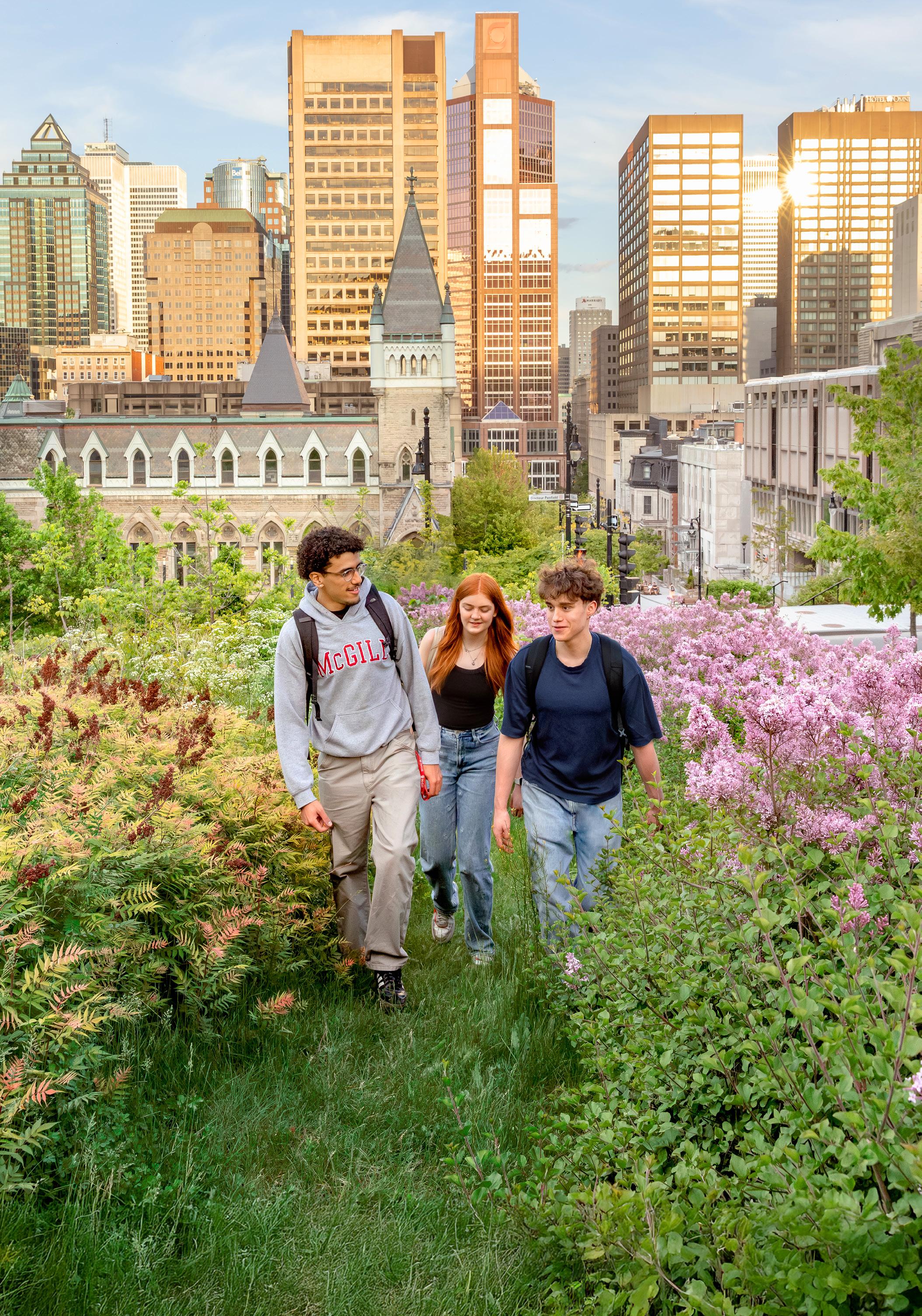
Undergraduate Viewbook 2026–27


Undergraduate Viewbook 2026–27
McGill University is a place to explore who you are and discover who you want to become.
You’ll be challenged to take risks and seek out opportunities. To test your limits, and set new ones. Surrounded by students with the drive, passion and talent to make the world a better place. Working with professors who want to mentor and exchange ideas, all while driving progress in their fields.
Our community has made us one of the world’s top-ranked universities for more than 200 years. With 325,000 alumni in 180+ countries and a research network that spans the globe, McGill will expand your world and help you create a path that’s true to you.
149 Rhodes Scholarships have been awarded to McGill students #1 in Canada among research universities for 20+ years1 #27 globally in the QS World University Rankings2
1 2025 Maclean’s University Ranking, 2 2026 QS World University Rankings

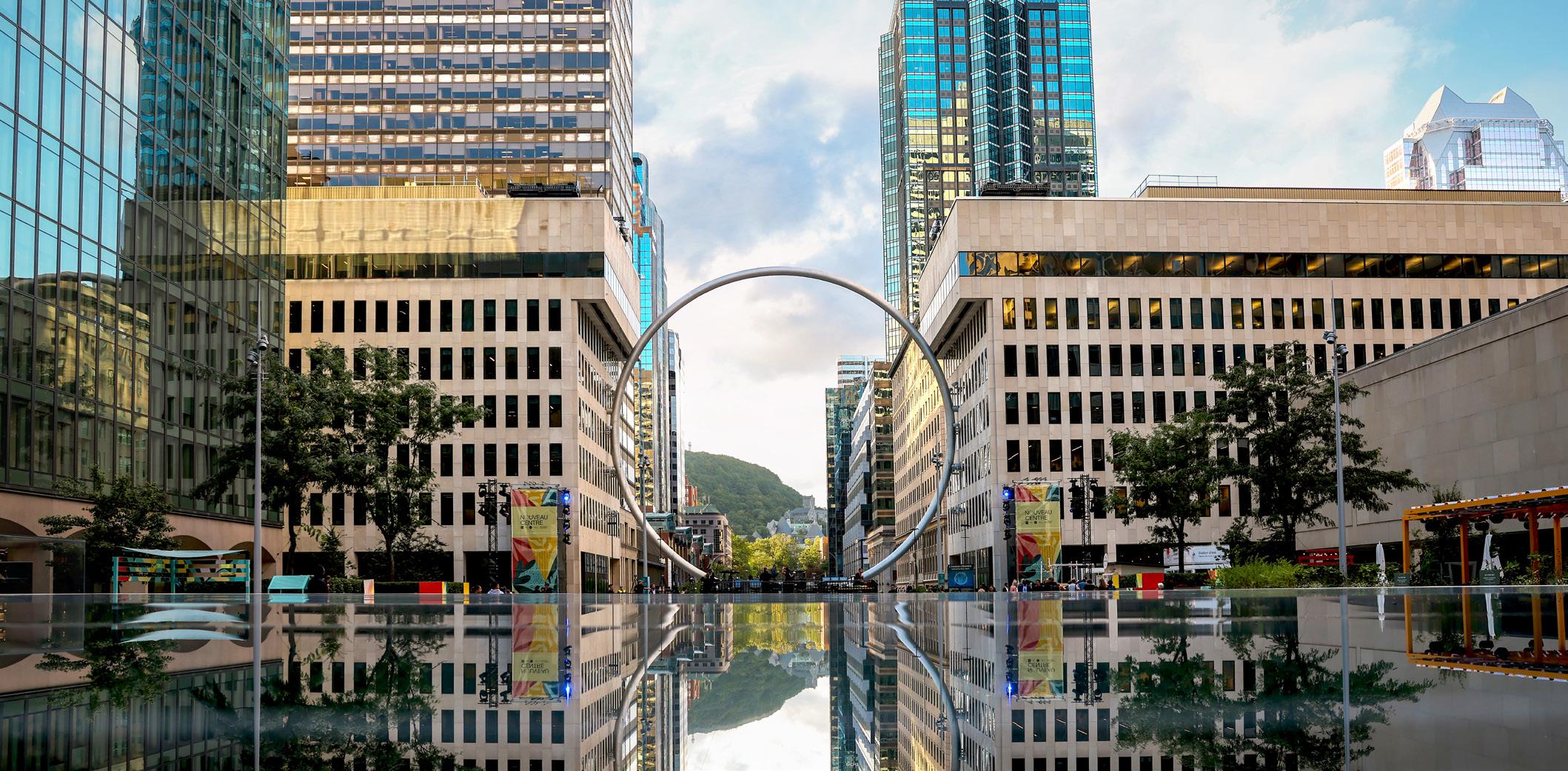
Montreal is a city fuelled by creativity, diversity and unforgettable experiences. Around 200,000 students choose Montreal each year for its open, welcoming community and its limitless potential for opportunity and adventure.
#1
student city in Canada 1 #1
safest city to visit in North America2
1 QS Best Student Cities, 2026, 2 Berkshire Hathaway Travel Protection, 2025
100+ festivals to explore each year

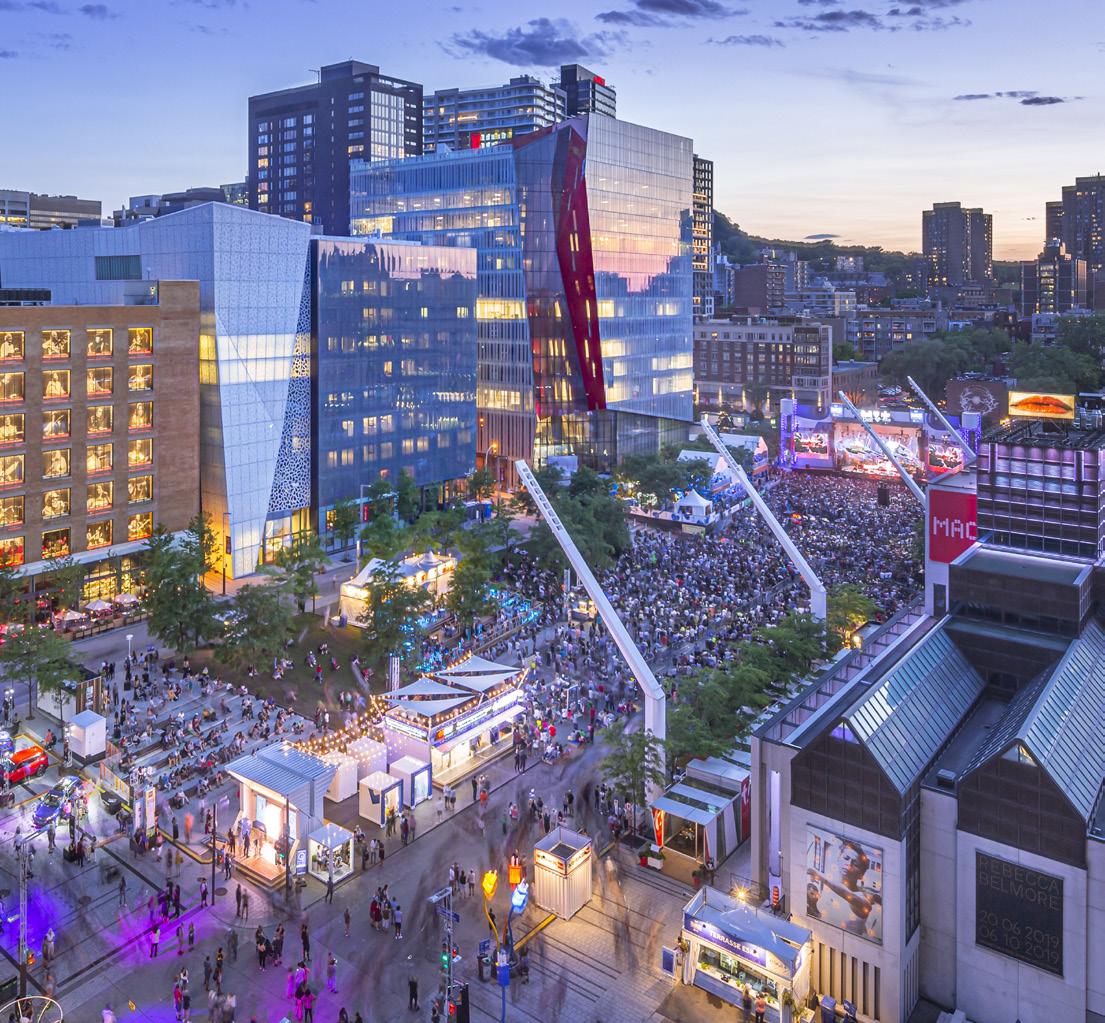
Montrealers are proudly multicultural, creative and social. Our city is full of public spaces like patios and parks where you can get to know your friends and neighbours. Montreal is home to 120 cultural communities, with the incredible range of cuisines, international markets and cultural celebrations that come with being such a globally connected city. You’ll hear French and English spoken alongside languages from around the world — often in the same conversation. This is a city you will quickly fall in love with and feel at home in.
100+ festivals, energetic nightlife and a lively arts and culture scene make our city truly unique. Montreal is filled with colourful neighbourhoods, vibrant murals, and hundreds of cafes, restaurants and museums to explore. Being such a creative city, Montreal is also a hub for innovation. We attract startups, multinational corporations and respected research centres working in AI, technology and creative industries, among others. There are endless opportunities for growth and adventure, and something new around every corner.
McGill University is on land which has long served as a site of meeting and exchange amongst Indigenous peoples, including the Haudenosaunee and Anishinabeg nations. We acknowledge and thank the diverse Indigenous peoples whose presence marks this territory on which peoples of the world now gather.
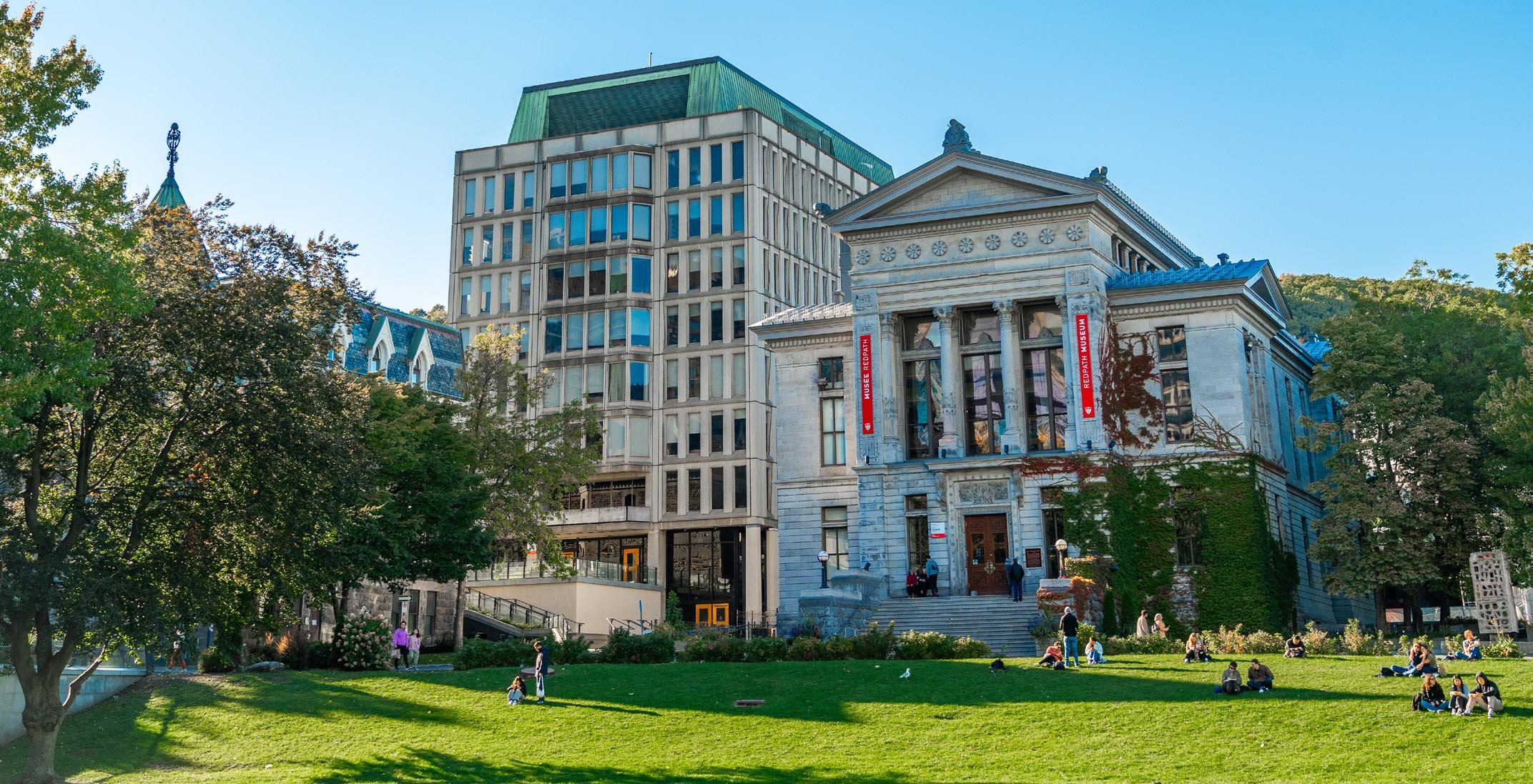
McGill’s Downtown Campus is in the heart of Montreal, steps away from the city’s best cafes, restaurants, festivals and nightlife. Our walkways, lined with towering trees and lush gardens, connect McGill’s 100+ historic buildings — each with a unique architectural style. Inside, you’ll find modern facilities and quiet study spots to explore, including McGill’s 13 libraries. The stunning Mount Royal Park sits at the top of campus, with miles of forested trails to hike, bike and even cross-country ski in winter.
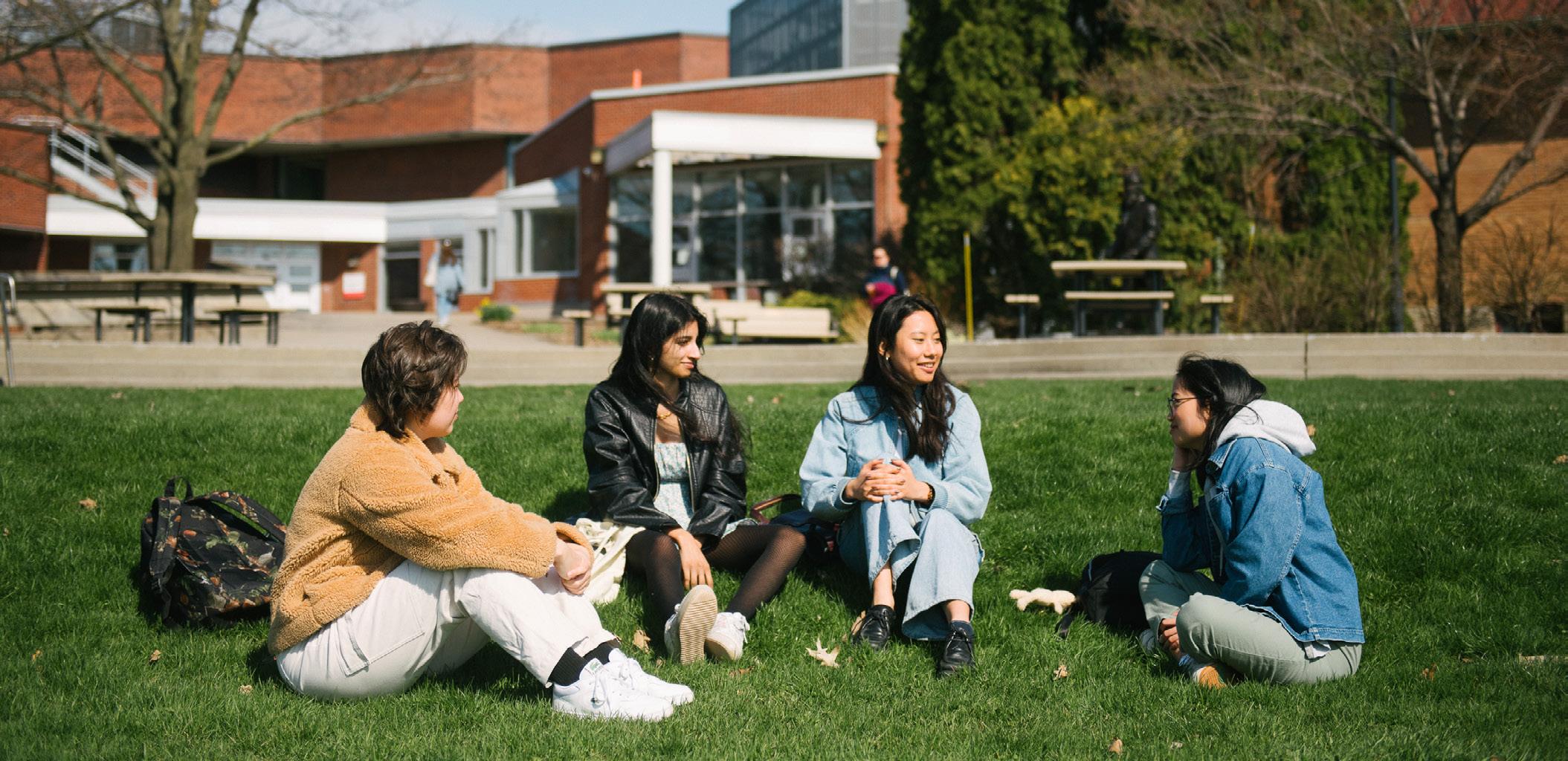
Macdonald Campus is the largest green space on the Island of Montreal, and home to McGill’s Faculty of Agricultural & Environmental Sciences. Hi-tech labs, greenhouses and more than 650 hectares of field, forest and riverfront make "Mac" the perfect campus for hands-on learning in environmental studies, agriculture, food sciences and bioengineering. Students love the tight-knit feel and access to nature that Mac offers. A free shuttle bus runs between McGill’s two Montreal campuses, located about 40 minutes apart.
Explore our campuses
With 325,000 alumni living and working in 180+ countries, McGill University offers degrees that are recognized and valued worldwide.
Be inspired to aim high McGill has some of the highest entering averages in Canada, which makes our campuses full of remarkably smart and driven students. Many go on to teach and conduct research at prestigious universities, launch business ventures or take on leadership roles in commercial, non-profit or governmental organizations around the world. Part of this success stems from the internship, research and entrepreneurial experiences they take advantage of here.
your
We can provide the support and mentorship you need to take great ideas from the lab or classroom into the real world. More undergraduates at McGill have launched successful startup companies than at any other university in Canada.1 Many benefitted from the award-winning business incubators on campus. This is a place to take risks and build confidence. Every opportunity you seize is a learning experience and a step towards becoming a leader.
93% of alumni working or studying 6 months after graduation2
#31 worldwide for graduate employability3
#1 university in Canada for producing CEOs4
1 Pitchbook, 2024, 2 McGill Destination Survey, 2024, 3 Times Higher Education, 2025, 4 Immerse Education, 2024
When you’re around people at McGill, you feel like you want to do better for yourself. I had the chance to launch a women's health startup through McGill's tech accelerator program and work directly with angel investors.
Now, as president of McGill's BioDesign team, I'm working with 200 students to build real-world health solutions.
These different parts of McGill — clubs, accelerators and networks — shaped my journey and taught me to go after what I’m interested in.

Tanjin (Montreal) Bioengineering ’27
Your professors at McGill are world experts, shaping the fields you study every day. They can also be your mentors. There are thousands of research projects happening across McGill and many undergraduates work in labs, even in the first year of their degree. Ask to join a professor’s research project. You might co-author a paper in a prominent publication, or discover an area of research that you'll want to pursue beyond your undergraduate degree. It’s an exciting way to build skills and gain paid work experience.
Many McGill students pursue paid internship and fieldwork experiences off campus. Your Faculty advisors can help you explore options and secure awards if you find an opportunity that is unpaid or requires travel. Some students do internships in Montreal or their hometown over the summer, while others join McGill's fieldwork courses in Panama, Barbados, East Africa or Italy. You can also take a French Immersion program to explore Quebec’s language and culture outside of Montreal.
10 Nobel Prizes have been awarded to McGillians
3,381 full-time professors on campus
10,000+ research papers published each year
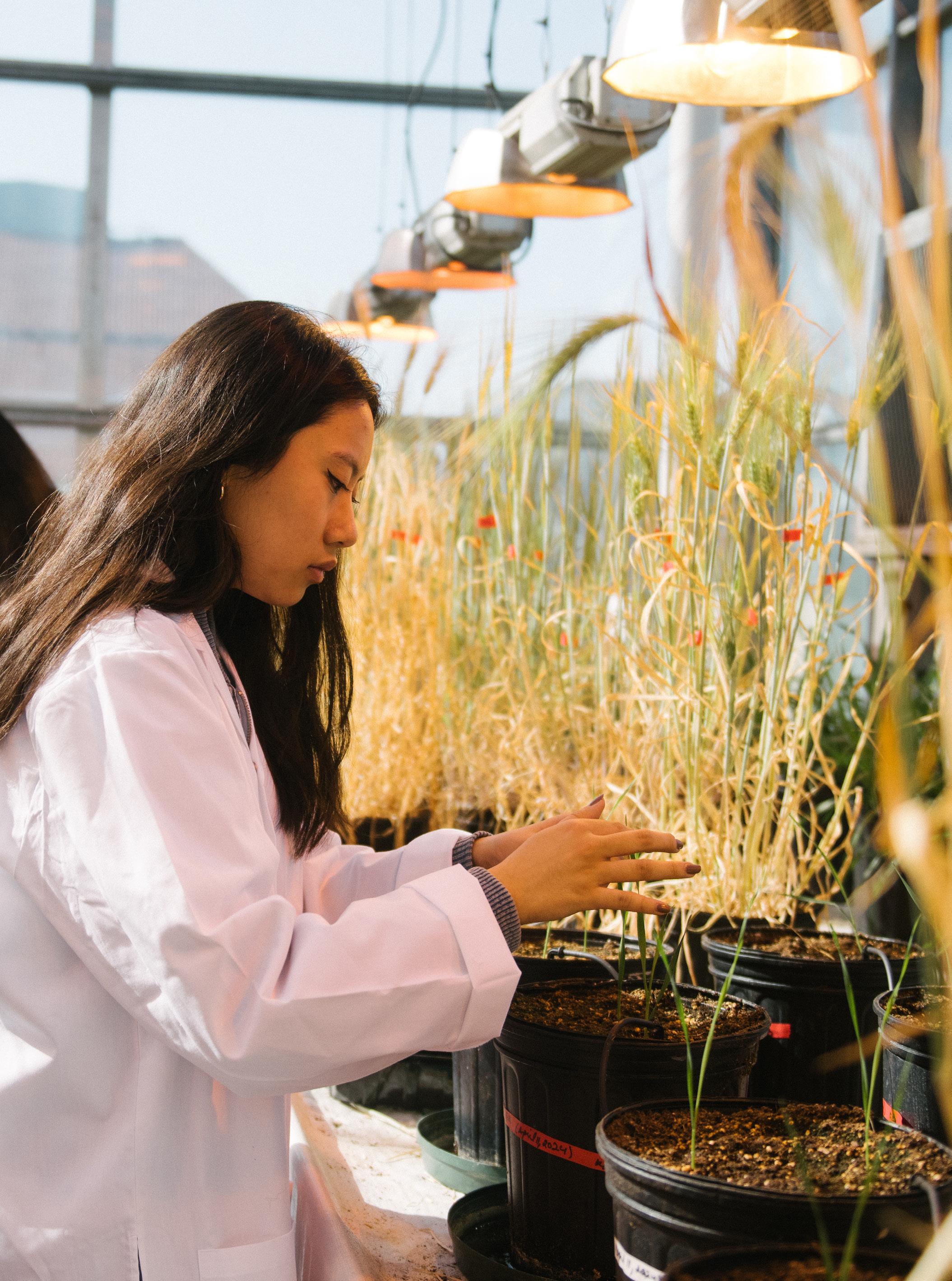
I reached out to professors, looking for research opportunities, and got a lab position doing tech work on a parasite. It’s something I would definitely recommend. It’s great talking to Master’s and PhD students about their research and getting honest feedback. Being familiar with a scientific environment makes you feel comfortable working in different labs — I know I’ll use the knowledge and skills I gained in a different context.
Au-Co (France) Life Sciences ’26
McGill's community of 39,000 students is incredibly diverse, with 30% coming from 150 countries outside Canada, and 20% from other Canadian provinces.
Our Student Services team will be there at every step of your university journey. From the early days of dealing with immigration, managing your finances and getting settled on campus, to ongoing accessibility support while you study and explore career options, we’re here to support and guide you.

McGill has spaces where you can connect with others who share your culture, experiences and traditions. First Peoples’ House provides support and a welcoming space for Indigenous students. You can also get involved with organizations like the Black Students’ Network, Queer McGill or one of McGill’s 45+ cultural and religious clubs.
The McGill community is super diverse, just like Montreal. You can meet all sorts of people. There are a lot of international students and the resources available help make the transition easier.
Teddy (Maine, US) Urban Studies ’28

You’ll be in spaces where people want your opinion because you’re a minority and they want to understand your experiences. There’s a genuine effort on campus to make us feel like we’re making a difference, and that there are dedicated spaces for us.
Orlane (Montreal) VP Finance - Black Students’ Network International Development Studies ’26
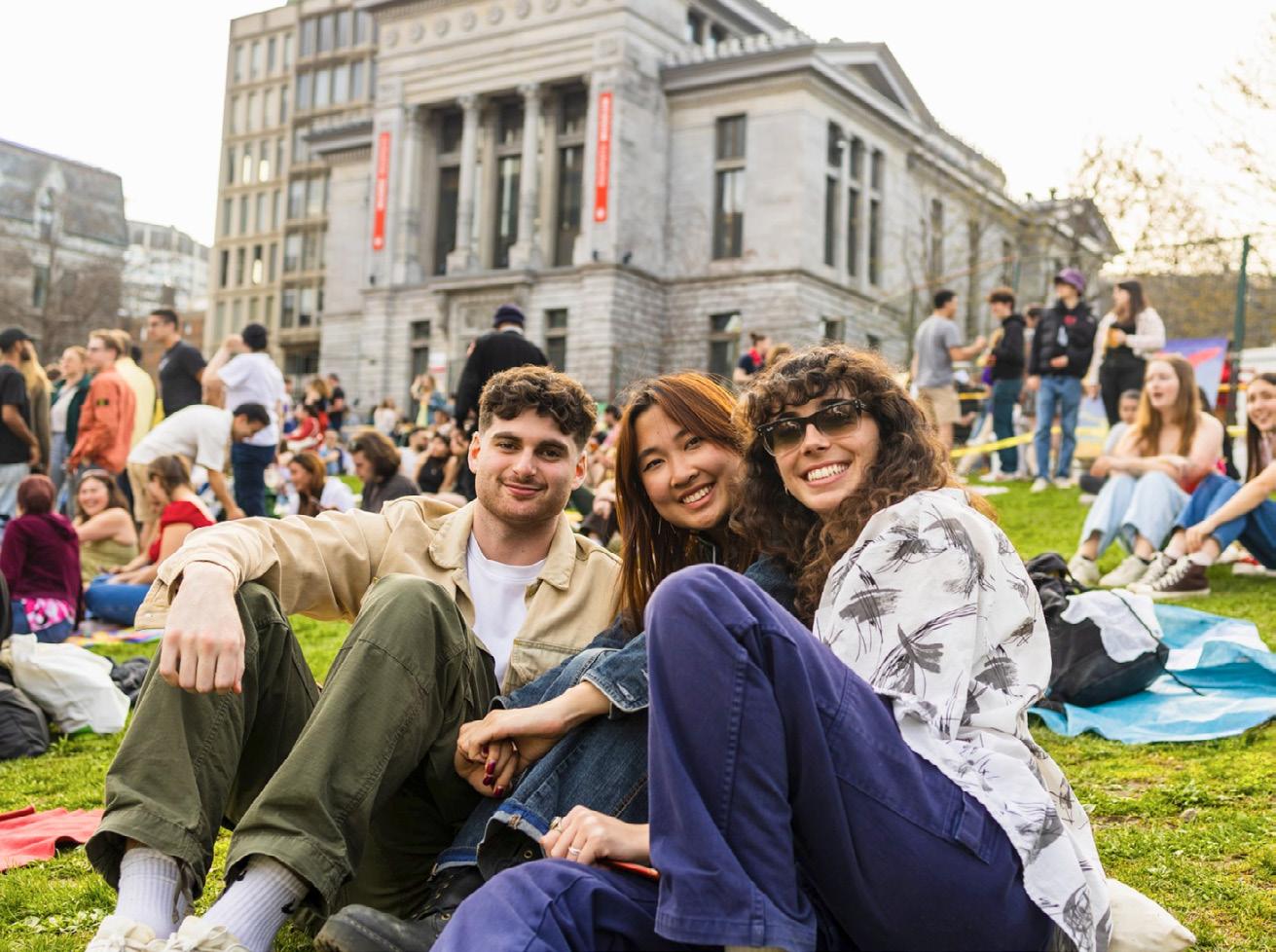
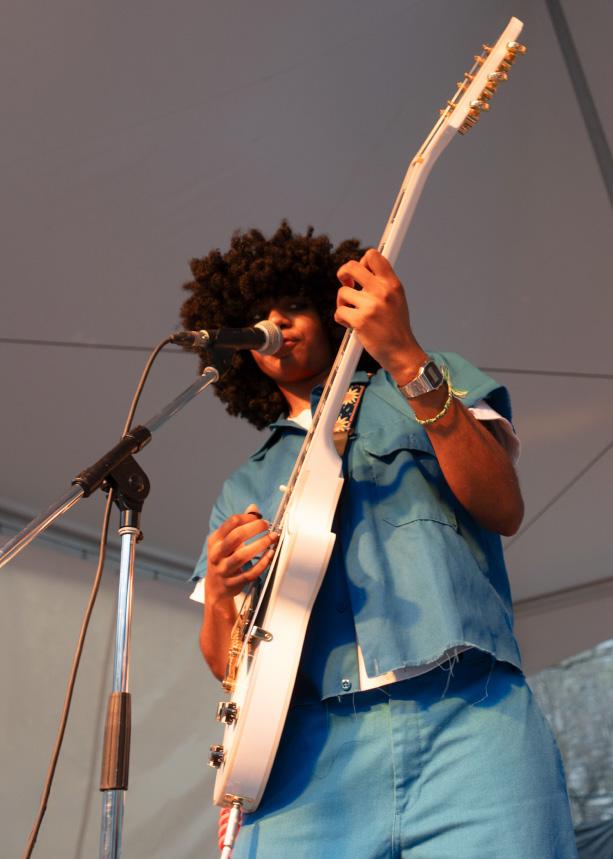
McGill students are known for “hustling 24/7” and that extends to social life and extracurriculars. Faculty societies and clubs help students gather around common interests and put on special events for the broader community. From nature hikes and excursions, to theatre productions, fashion shows, cultural events and even language classes — you'll get to meet people with all kinds of interests, share your own passions and discover new ones.
OAP is a campus tradition you won’t find anywhere else. This multiday music festival happens twice a year on McGill’s lower campus. Started in 1987 by McGill’s Engineering Undergraduate Society and known as the “best place in the world,” OAP features a BBQ and live performances by McGill students. This is just one example of the incredibly creative initiatives our students bring to life on campus.
250+ student-run clubs, services and groups
30 pick-up sports, intramurals and student-led sports clubs
20 cafes and dining halls on campus
The McGill experience is really driven by students. We put on social events like OAP and frosh and there are niche events and clubs that you won’t find at other universities, since you have people coming from such different backgrounds. Your time at McGill is really what you make of it, there's so much to do.
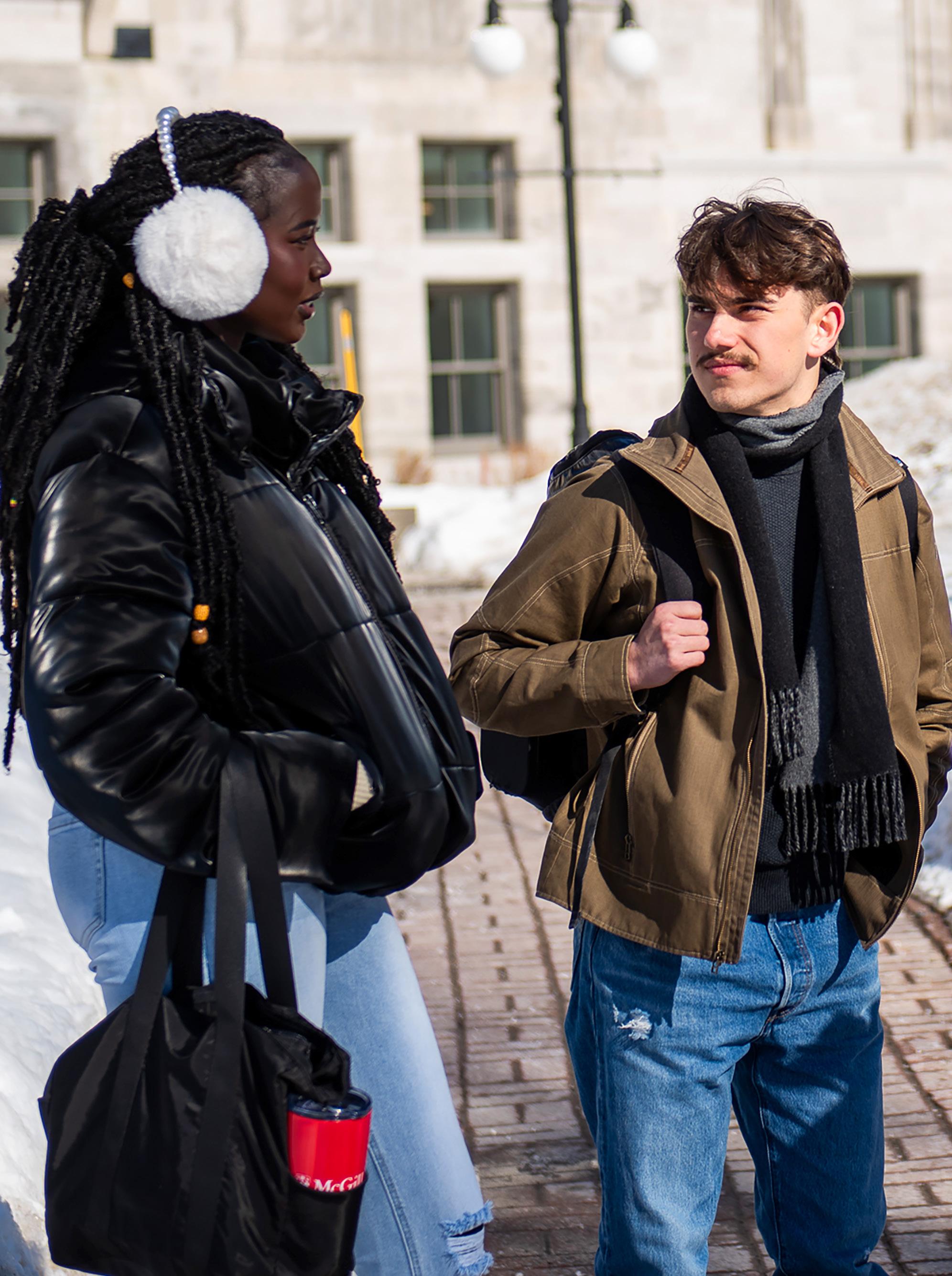
Pearce-Tai (Pennsylvania, US) Cognitive Science & Psychology ’27
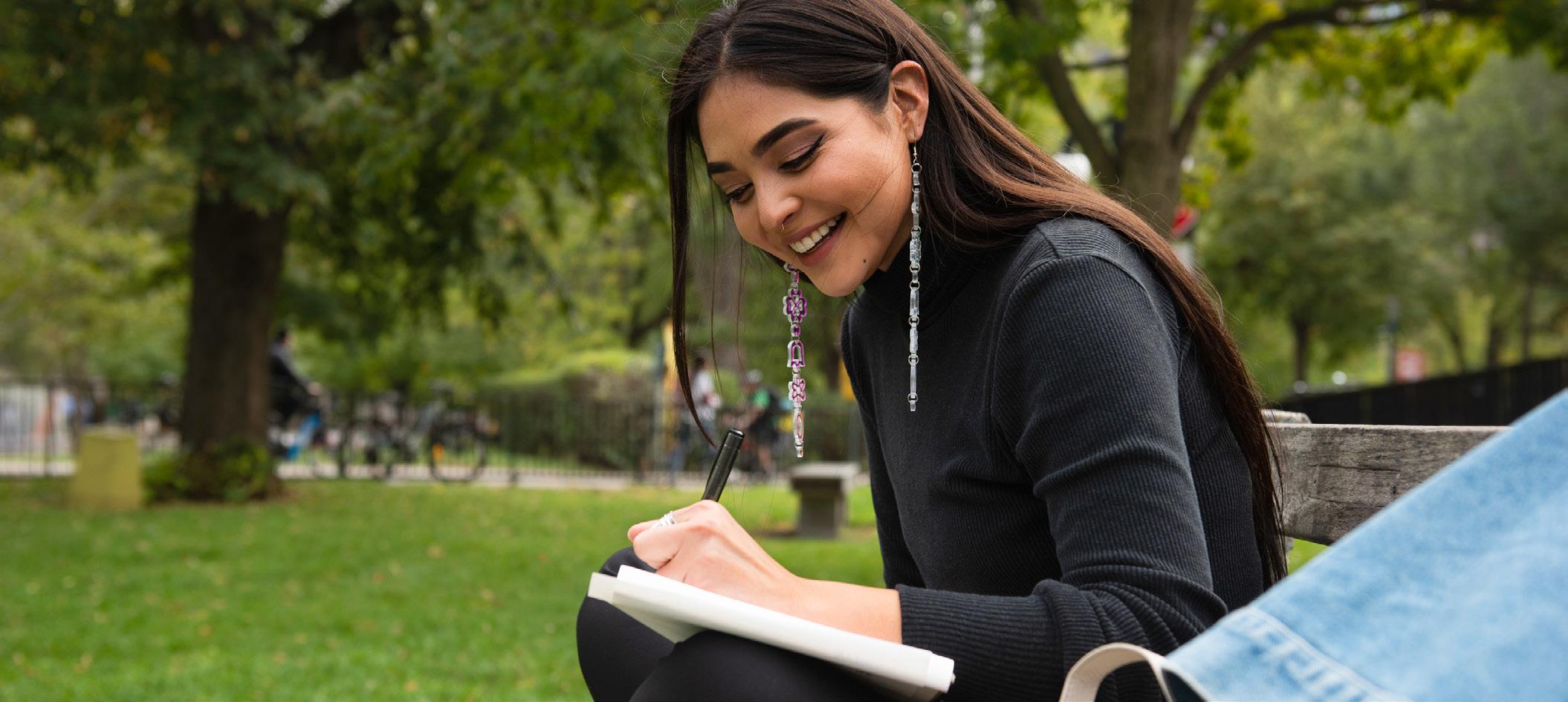
McGill’s Wellness Hub has on-site counsellors and clinicians who can help to address any issues related to your health and wellbeing during your degree. They offer a variety of free programs to boost your mood and energy, like art and animal therapy sessions, peer supporters and a “zen den” to relax in. The Hub also has dedicated Wellness Advisors for students who are Black, Indigenous, people of colour and/or 2SLGBTQIA+.
Sustainability is one of the greatest challenges of our times. Our community is working hard to find solutions making our campuses and communities more environmentally friendly, and centring sustainability issues in each area of study. You’ll be able to contribute to something bigger here, whether that’s joining a grassroots initiative or research project or launching your own idea through McGill’s Sustainability Projects Fund.
#15 worldwide for research on climate action1 80% of academic departments offer sustainability courses $1M allocated to student sustainability projects annually
1 2026 QS World Rankings in Sustainability
At McGill you can shape a learning experience that fits your unique goals and interests.
Our programs let you build a degree that is customized to your career goals and personal interests. Your major is your primary area of study. Many programs include specializations, concentrations and honours options to dive deeper into a particular subject. You can also choose a minor that complements your major, or use this to explore other passions and gain knowledge in a different subject. Your program advisor can guide you through this process after you’ve accepted an offer of admission.
Most students who have completed a high school diploma will begin their studies at McGill in U0 (other schools may call this First Year, Freshman or Year 1). If you’ve taken an advanced curriculum — A-Levels; AP; CAPE; European, French or International Baccalaureate; or European Bolognacompliant high school diploma — you could be granted up to a full year of university credit and start in U1. You will still be considered a first-year student whether you start in U0 or U1.
Our professional programs in the Faculties of Dentistry, Law and Health Sciences are open to students who have completed an undergraduate degree.
Search for your program
McGill’s Macdonald Campus — home to the Faculty of Agricultural & Environmental Sciences — is the ideal place for hands-on learning in sustainability, science and innovation. Gain the skills and knowledge to address challenges like food security, climate change and global health.
Bachelor of Science in Agricultural and Environmental Sciences (BSc(AgEnvSc))
• Agricultural Economics
• Environment
• Environmental Biology
• Life Sciences (Biological & Agricultural)
• Sustainable Agricultural Systems
Specializations:
• Agribusiness
• Animal Biology
• Animal Health & Disease
• Animal Production
• Applied Ecology
• Environmental Economics
• Field Crops & Horticulture
• Global Food Security
• Life Sciences (Multidisciplinary)
• Livestock
• Microbiology & Molecular Biotechnology
• Plant Biology
• Professional Agrology
• Soil & Water Resources
• Wildlife Biology Concentrations (for Environment Major only):
• Biodiversity & Conservation
• Ecological Determinants of Health
• Environmetrics
• Food Production & Environment
• Land Surface Processes & Environmental Change
• Renewable Resource Management
• Water Environments & Ecosystems
Bachelor of Science in Food Science (BSc(FSc))
• Food Science (options in Food Science, Food Chemistry)
Bachelor of Science in Nutritional Sciences (BSc(NutrSc))
• Dietetics
• Nutrition (concentrations in Food Function & Safety, Global Nutrition, Metabolism, Health and Disease, Sports Nutrition)
1,200+ undergraduate students
13 research units $250K+ scholarships & awards
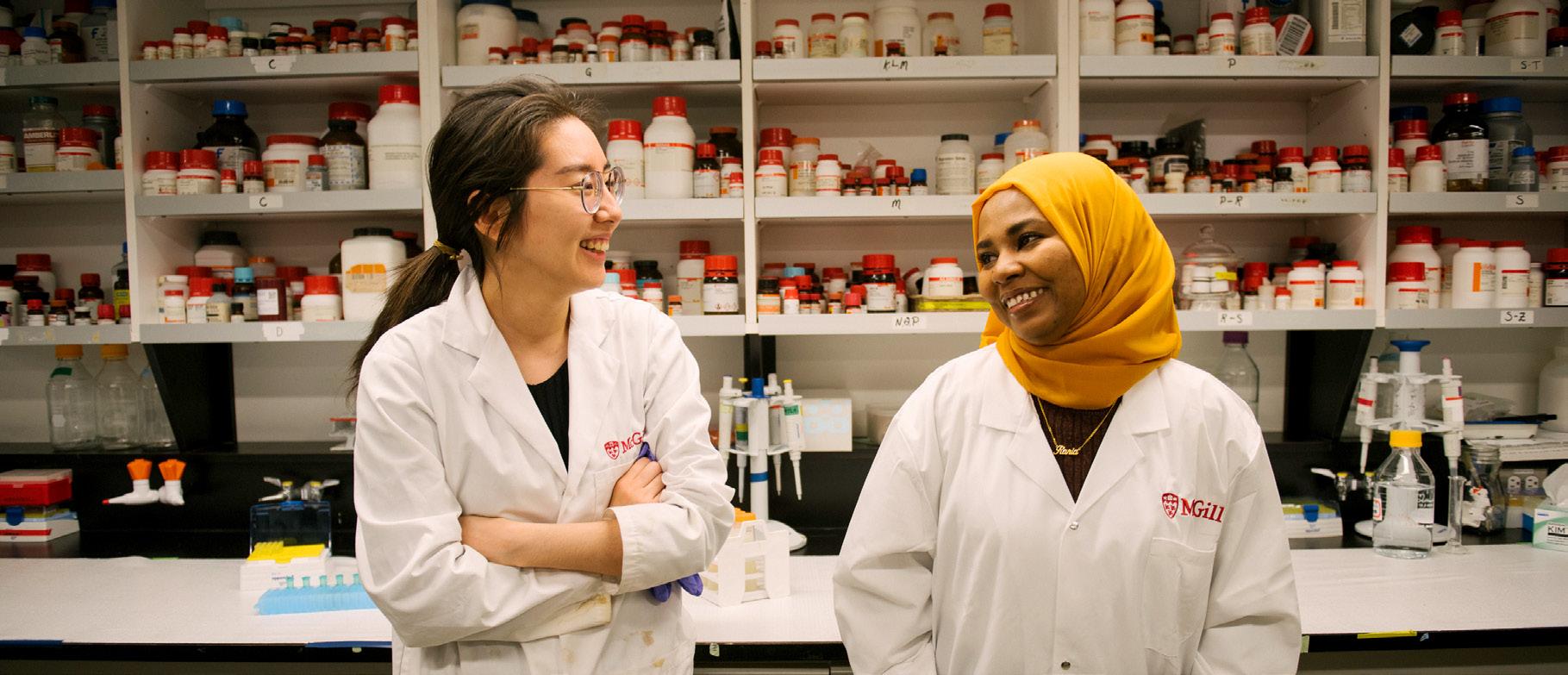
Concurrent Bachelor of Science in Food Science (BSc(FSc)) and Bachelor of Science in Nutritional Sciences (BSc(NutrSc))
• Food Science & Nutritional Sciences
Bachelor of Engineering in Bioresource Engineering (BEng(Bioresource)
• Bioresource Engineering
• Bioresource Engineering
— Professional Agrology
Streams:
• Bio-Environmental Engineering
• Bio-Process Engineering
• Bio-Production Engineering
Tailor your program
Honours programs and Minor programs available.
Note:The Faculty of Agricultural & Environmental Sciences also offers Honours and Minors programs.
• Field courses and field study semesters overseas (Africa, Barbados, Panama)
• Industry internships with top employers around the world
• Research opportunities with renowned faculty
These symbols next to a major means it is offered in more than one degree.
As the hub of McGill’s social sciences and humanities programs, the Faculty of Arts is where you’ll learn to engage in thoughtful debate, craft innovative solutions and express your ideas with clarity and impact.
Bachelors of Arts
• Accounting
• African Studies
• Anthropology
• Art History
• Canadian Studies
• Classics
• Computer Science
• East Asian Studies
• Economics
• English: Cultural Studies
• English: Drama & Theatre
• English: Literature
• Environment
• Finance
• Gender, Sexuality, Feminist & Social Justice Studies
• Geography
• Geography: Urban Studies
• German Studies
• Hispanic Studies
• History
• International Development Studies
• Italian Studies
• Jewish Studies
• Langue et littérature françaises
– Études et pratiques littéraires
• Langue et littérature françaises
– Traduction
• Latin American & Caribbean Studies
• Liberal Arts
• Linguistics
• Mathematics
• Philosophy
• Political Science
• Psychology
• Religious Studies (see also Bachelor of Theology)
• Russian
• Sociology
• Software Engineering
• Statistics
• World Islamic & Middle East Studies
Programs available as minors only:
• Arabic Language
• Behavioural Science
• Communication Studies
• Computer Science, Supplementary
• East Asian Cultural Studies
• East Asian Language & Literature
• East Asian Language, Supplementary
• Education for Arts Students
• Educational Psychology
• Entrepreneurship for non-Management students
• European Literature & Culture
• German Language
• GIS & Remote Sensing
• Health Geography
• History & Philosophy of Science
• Indigenous Studies
8,000+ undergraduate students
300+ faculty members
150+ in-course scholarships & awards
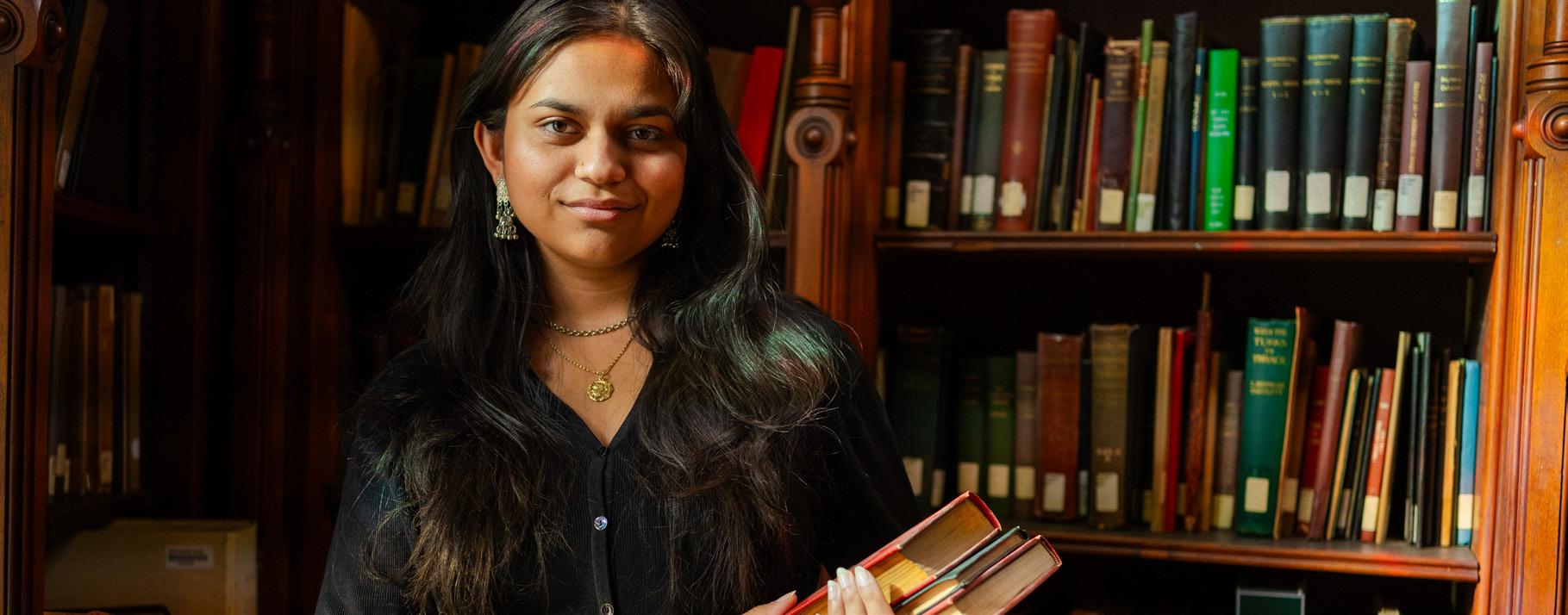
• Langue et littérature françaises
Langue française
• Management
• Mathematics, Supplementary
• Medieval Studies
• Persian Language
• Quebec Studies and Community-Engaged Learning
• Russian Culture
• Science for Arts Students
• Social Studies of Medicine
• South Asian Studies
• Statistics, Supplementary
• Turkish Language
• Urdu Language
• World Cinemas
Applicants from high school are not eligible to apply directly to the BSW but must select the Freshman/ Foundation Year program on their application form. Following their Freshman/Foundation year, they are eligible to apply to transfer to Social Work.
• Social Work
• Theology
School of Population and Global Health
• New: Bachelor of Arts (BA)Faculty Program in Population and Global Health
Note: As of Fall 2025, if you enrol in a program offered by a faculty other than Arts (eg. Psychology, Geography, Computer Science or Math, which are all offered by the Faculty of Science), you must also enrol in at least one Arts program.
• Field courses
• Field study semesters abroad (Africa, Barbados, Panama)
• Internships
• Research Assistantships
• Summer research internships
Computer science helps us understand and shape the digital world we live in—from AI and climate modeling to healthcare and game design. Studying it will teach you how to solve complex problems and develop technology that can change lives.
PROGRAMS OFFERED IN:
Faculty of Arts:
• Computer Science
• Software Engineering
• Minor Concentration Computer Science
• Supplementary Minor Concentration in Computer Science
Faculty of Science:
• Computer Science
• Computer Science
- Artificial Intelligence
• Computer Science
– Computer Games
• Software Engineering
• Mathematics & Computer Science
• Statistics & Computer Science
• Computer Science & Biology
• Physics & Computer Science
• Minor Concentration in Computer Science
Bachelor of Arts and Science (BA&Sc):
• Computer Science
• Software Engineering
• Minor Concentration in Computer Science
The Faculty of Engineering’s Department of Electrical and Computer Engineering offers a Bachelor of Engineering (BEng) in Computer Engineering and Bachelor of Engineering (BEng) in Software Engineering (Co-op).
Hands-on learning opportunities:
• Independent Studies in Computer Science
• Industrial Practicum (IP)
• Internships
• Internship Year in Science (IYS) (BSc only)
• Research Assistantships
• Summer research project
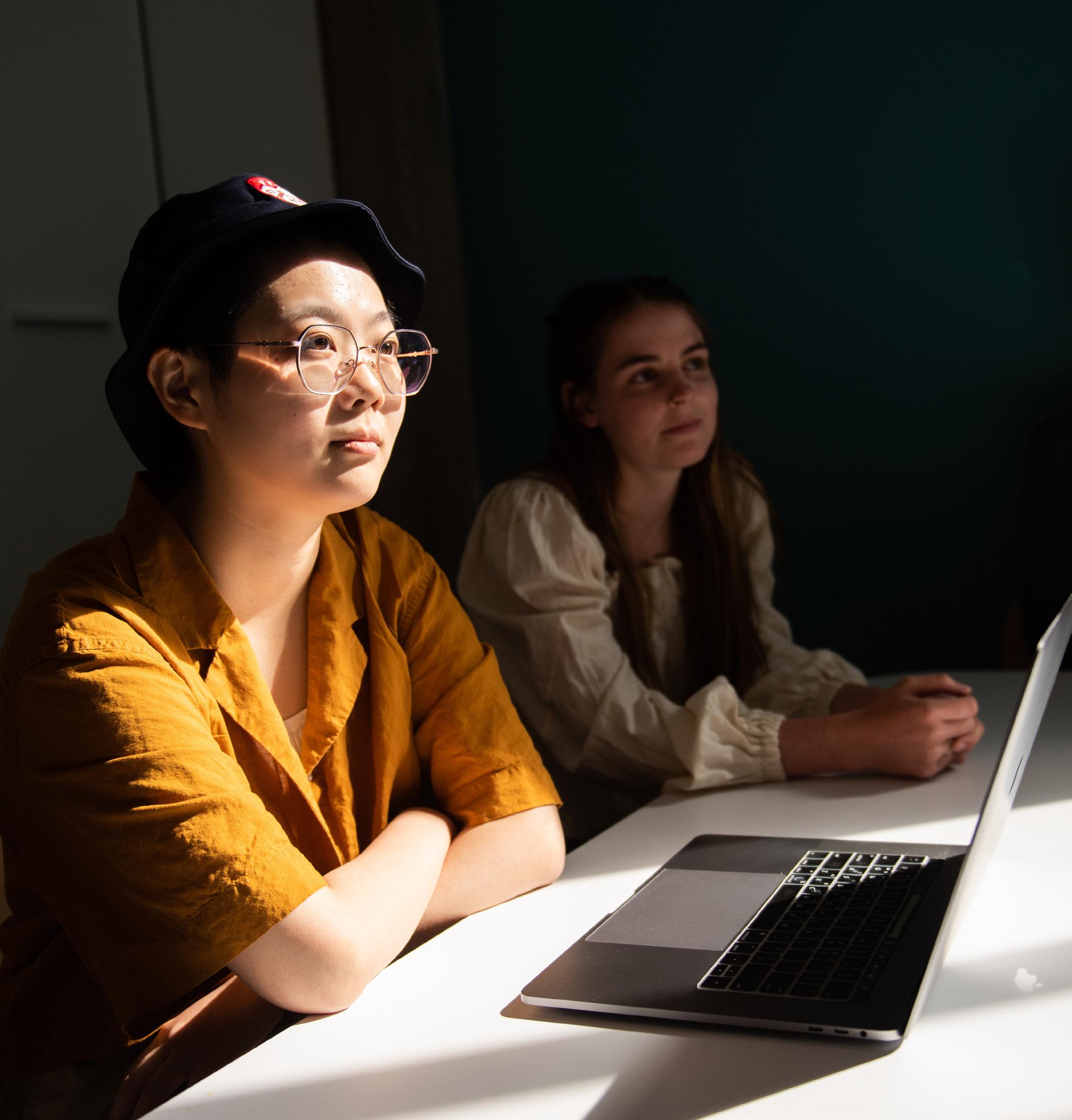
50+
years of visionary thinking
3 paths to study computer science (BA, BSc or BA&Sc)
11 research areas
Curious about the power of education to shape lives and communities? At the Faculty of Education, you’ll explore how learning transforms people and society, while gaining the skills needed to make a real impact in the classroom and beyond.
Bachelor of Arts
• BA(Education); Education in Global Contexts
Bachelor of Education (BEd)
• Kindergarten & Elementary Education
• Kindergarten & Elementary Education - First Nations & Inuit Studies
• Kindergarten & Elementary Education - Jewish Studies
• Kindergarten & Elementary Education - Pédagogie de l’immersion française
• Physical & Health Education
• Secondary Education: English
• Secondary Education: Mathematics
• Secondary Education: Science & Technology
• Secondary Education: Social Sciences
• Teaching English as a Second Language (TESL)
• Teaching English as a Second Language (TESL) – Greek Language & Culture
Concurrent Bachelor of Music (BMus) and Bachelor of Education (BEd)
The Concurrent BMus/BEd combines the Bachelor of Music (Major Music Education) with the Bachelor of Education (Music Elementary & Secondary).
Bachelor of Science in Kinesiology (BSc(Kinesiology))
• Kinesiology
Students in Kinesiology can take a Minor in Entrepreneurship for non-Management students.
Hands-on learning opportunities:
• Field experiences/ Student teaching
• Internships (BA(Education))
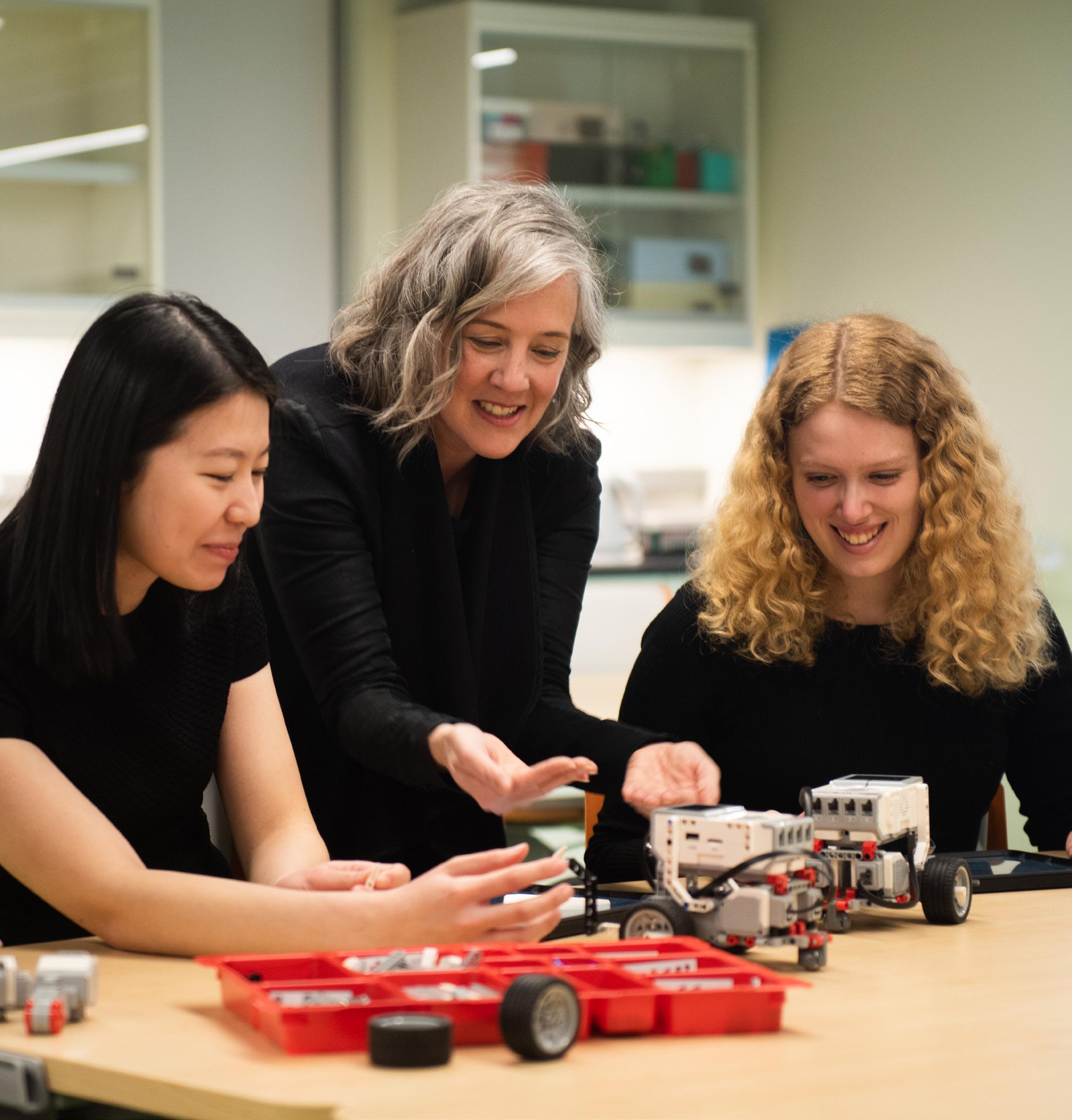
1,600+ undergraduate students
4 degrees offered (BA, BEd, BMus, BSc)
13 teacher certification programs
Whether you’re passionate about building sustainable cities, designing cutting-edge tech or creating solutions to today’s biggest challenges, the Faculty of Engineering gives you the tools, mentorship and hands-on experience to achieve your professional goals.
Bachelor of Engineering (BEng)
• Bioengineering
• Chemical Engineering
• Civil Engineering
• Computer Engineering
• Electrical Engineering
• Global Engineering
• Materials Engineering (Co-op)
• Mechanical Engineering
• Mining Engineering (Co-op)
• Software Engineering (Co-op)
Interested in Bioresource Engineering? See Faculty of Agricultural & Environmental Sciences.
Bachelor of Science in Architecture (BSc(Arch))
• Architecture (Pre-professional) Programs available as minors only:
• Aerospace Engineering
• Applied Artificial Intelligence
• Arts
• Biomedical Engineering
• Biotechnology
• Chemistry
• Computer Science
• Construction Engineering & Management
• Economics
• Environment
• Environmental Engineering
• Management
• Mathematics
• Nanotechnology
• Physics
• Technological Entrepreneurship
• Co-op programs in Mining, Materials and Software Engineering
• Engineering Internship Program (EIP)
• Field courses
• Summer Undergraduate Research in Engineering program (SURE)
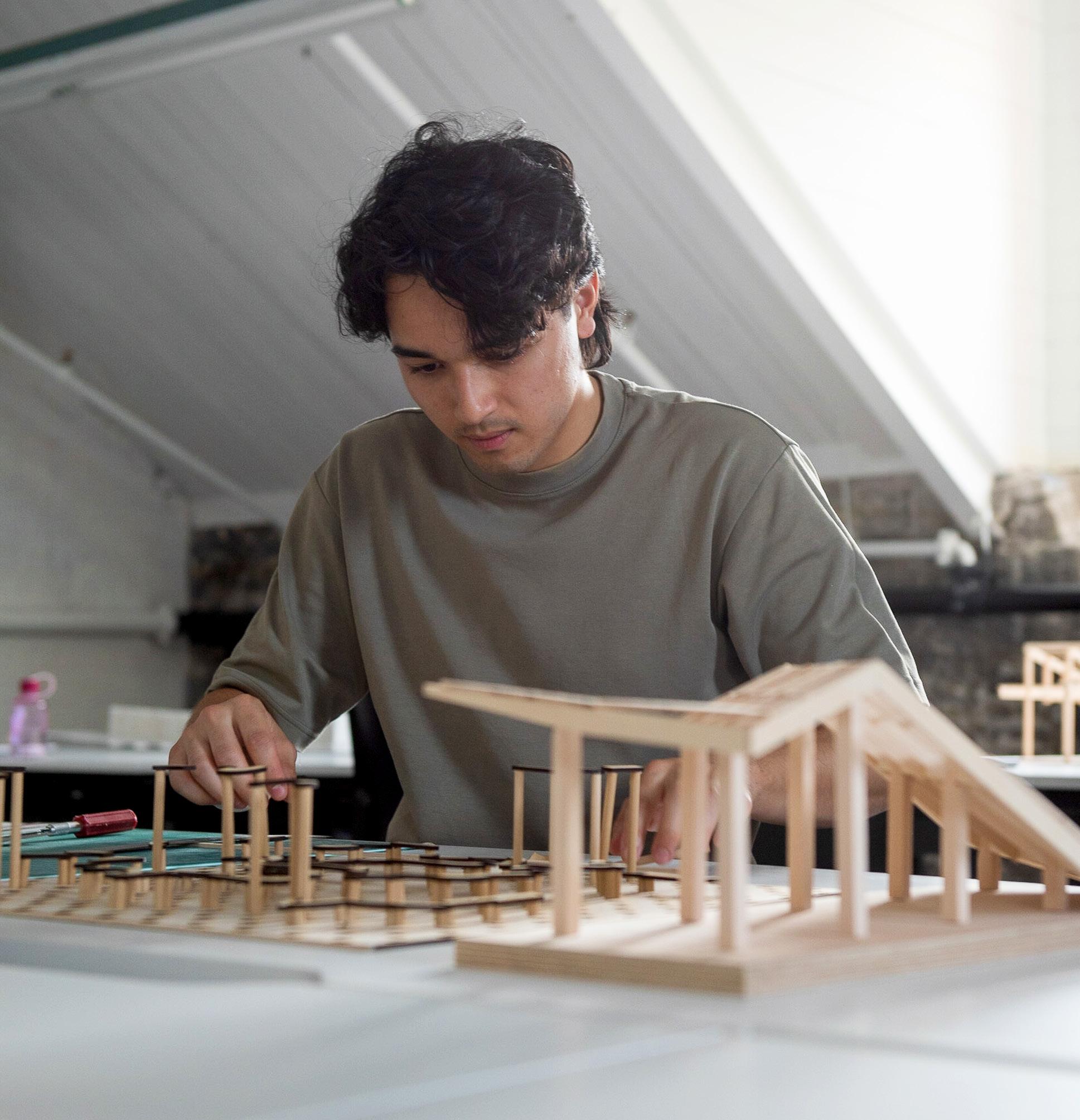
3,600+ undergraduate students
300+ placements through the Engineering Internship Program
173+ in-course scholarships & awards
The Bieler School of Environment is a joint initiative of the Faculties of Arts, Science and Agricultural and Environmental Sciences. You’ll explore both the social and natural sciences, building a strong foundation to help you understand and solve the environmental challenges we face today.
Faculty of Agricultural and Environmental Sciences
BSc(AgEnvSc)
Major in Environment Concentrations:
• Biodiversity & Conservation
• Ecological Determinants of Health
• Environmetrics
• Food Production and Environment
• Land Surface Processes & Environmental Change
• Renewable Resource Management
• Water Environments & Ecosystems
Faculty of Arts BA
Faculty Program in Environment Concentrations:
• Ecological Determinants of Health in Society
• Economics & the Earth's Environment
• Environment & Development
Faculty of Science BSc
Major in Environment Concentrations:
• Atmospheric Environment & Air Quality
• Biodiversity & Conservation
• Earth Sciences & Economics
• Ecological Determinants of Health in Society
• Environmetrics
• Food Production & Environment
• Land Surface Processes & Environmental Change
• Renewable Resource Management
• Water Environments & Ecosystems
Bachelor of Arts & Science (BA&Sc):
• Interfaculty Program ‒Environment
• Interfaculty Program ‒Sustainability, Science & Society
Minor (or Minor Concentration) in Environment
For students majoring in an area other than Environment.
Hands-on learning opportunities:
• 401 research projects
• Bieler Undergraduate Research Award projects (BURA)
• Field courses
• Field study semesters abroad (Africa, Barbados, Panama)
• Internships
• Research Assistantships
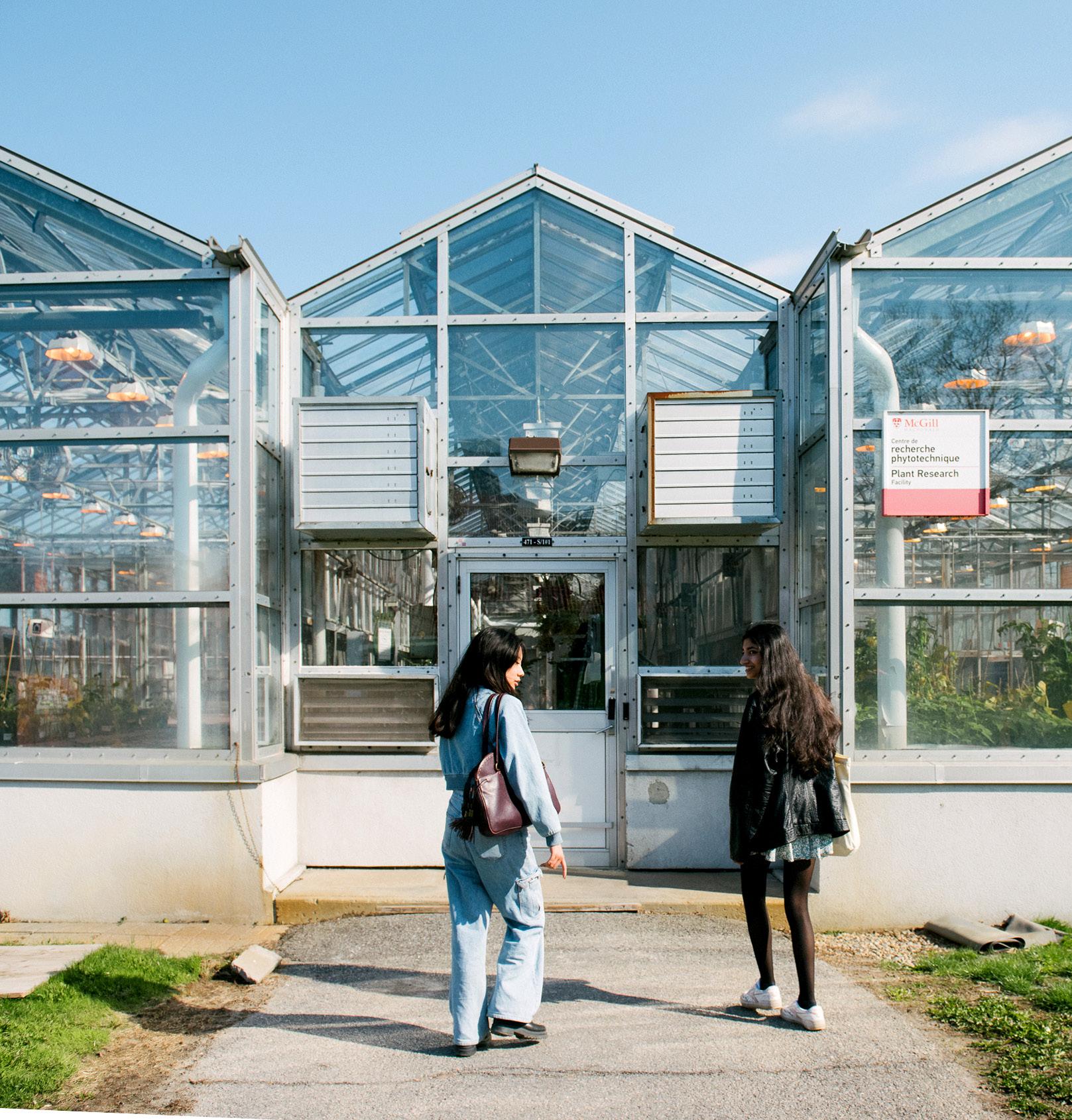
2 campuses
53 faculty and associate members $150K+ in undergraduate student awards
Gain the real-world experience and problem-solving skills you’ll need in the Desautels Faculty of Management — one of the world’s leading international business schools. You’ll be encouraged to think creatively, work collaboratively and to grow as an individual.
Bachelor of Commerce (BCom)
• Accounting
• Business Analytics
• Economics
• Ethics
• Finance
• General Management (with concentrations in Accounting, Business Analytics, Entrepreneurship, Finance, Information Technology Management, International Business, Labour-Management Relations & Human Resources, Managing for Sustainability, Marketing, Operations Management, Organizational Behaviour and Human Resources, Retail Management, Strategic Management
– Global Strategy, Strategic Management – Social Business & Enterprise)
• International Management
• Managing for Sustainability
• Marketing
• Mathematics and Statistics for Management
• Retail Management
• Statistics
• Strategic Management Programs available as Honours only:
• Investment Management The minor programs offered in the Faculties of Arts & Science may be taken in conjunction with any BCom program, unless otherwise indicated.
Hands-on learning opportunities:
• Directed Experiential Learning Practicum
• Experiential learning courses
• Integrated Management Student Fellowship (IMSF)
• Internships
• Study Trips
• Summer Internship in Management
These symbols next to a major means it is offered in more than one degree. Agricultural & Environmental Science Arts BA&Sc Engineering Sciences
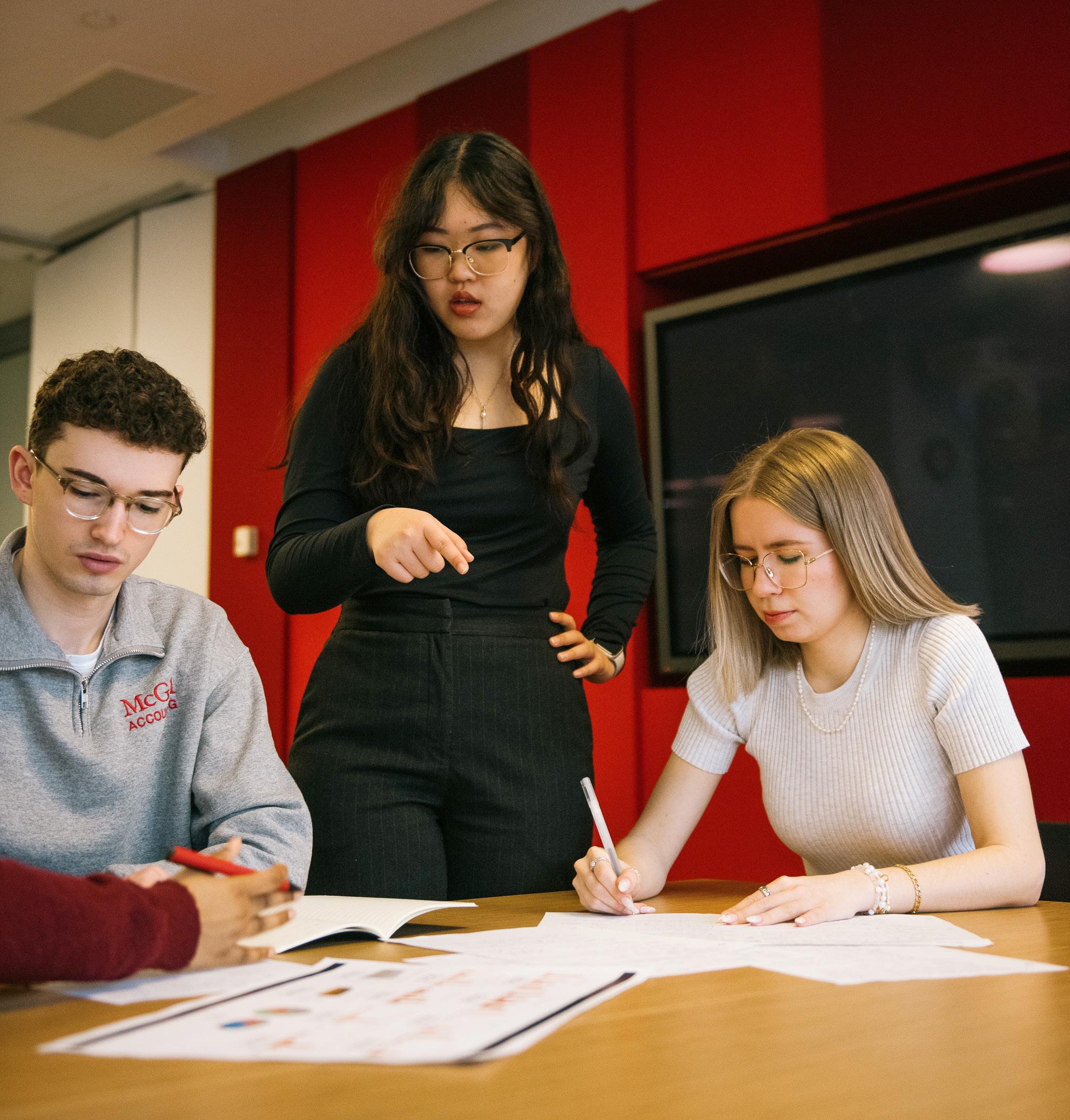
6 research centres #1 in Canada for developing successful female founders 1
32,000 successful alumni around the globe 12024 PitchBook University rankings
With 200+ professors, numerous ensembles and performance opportunities, and state-of-the-art facilities, you’ll experience the highest international standards of excellence in musical training.
Bachelor of Music (BMus)
• Composition
• Faculty Program (Jazz Concentration)
• Music History/Musicology
• Music Studies
• Music Theory
• Early Music (Instruments)
• Early Music (Voice)
• Jazz (Instruments and Voice)
• Orchestral Instruments (Brass, Percussion, Strings, Woodwinds)
• Organ/Guitar
• Piano
• Voice
Licentiate in Music:
• Early Music
• Jazz (Instruments and Voice)
• Orchestral Instruments (Brass, Percussion, Strings, Woodwinds)
• Organ/Guitar
• Piano
• Voice Programs available as minors only:
• Conducting
• Music Applied Performance Sciences
• Music Entrepreneurship
• Music Science and Technology
• Musical Applications of Technology
Concurrent Bachelor of Music (BMus) & Bachelor of Education (BEd)
The Concurrent BMus/BEd combines the Bachelor of Music (Major Music Education) with the Bachelor of Education (Music Elementary & Secondary).
Minors available to students in other faculties:
• Conducting
• Musical Applications of Technology
• Music Composition
• Music Education
• Music Entrepreneurship
• Music History
• Musical Science & Technology
• Music Theory
For information on applying to Bachelor of Music programs, see mcgill.ca/music/admissions/ undergraduate.
Hands-on learning opportunities:
• Ensembles
• Internships
• Research Assistantships

450+ undergraduate students
200+ faculty members
700+ concerts and events annually
Our program offers innovative courses that will help you develop fundamental nursing expertise, opening the door to a variety of exciting career opportunities. You’ll work closely with expert professors and gain hands-on experience and knowledge in a McGill teaching hospital or affiliated centre.
Bachelor of Science (Nursing) (BSc(N))
• Nursing Hands-on learning opportunities:
• Clinical studies/learning activities
• Satoko Shibata Clinical Nursing Learning Laboratories
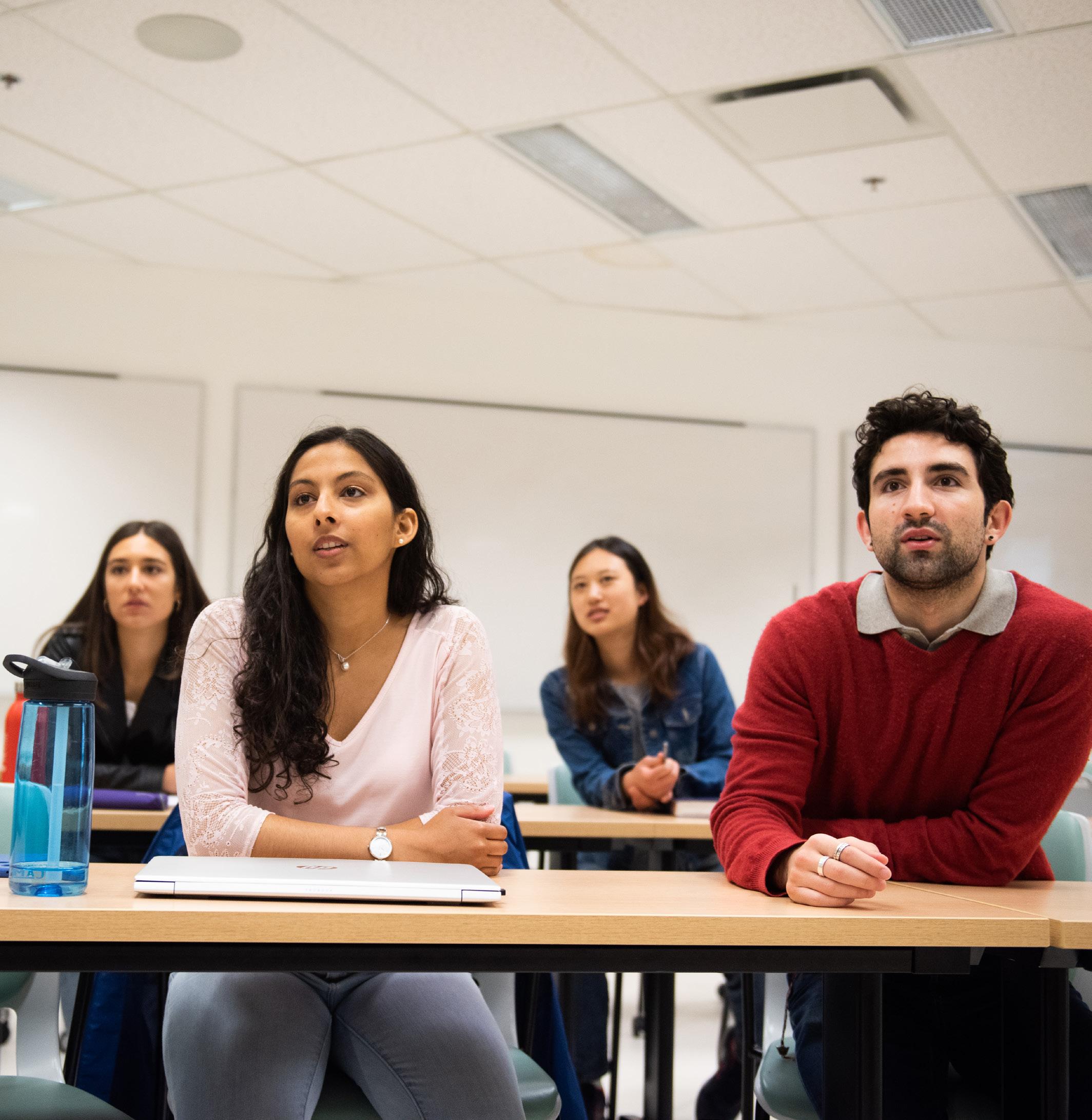
800+ undergraduate students
8 affiliated research centres
5 major health and disease research areas
You can benefit from flexible degree structures, fieldstudy semesters, internships and early access to research experiences in the Faculty of Science. Our programs prioritize interdisciplinary, hands-on learning that prepares you for today’s interconnected scientific world.
Bachelor of Science (BSc)
Biological, Biomedical & Life Sciences group:
• Anatomy & Cell Biology
• Biochemistry
• Biology
• Microbiology & Immunology
• Pharmacology
• Physiology
• Psychology
Bio-Physical-Computational Sciences group:
• Biology & Mathematics
• Computer Science & Biology
• Physiology & Mathematics
• Physiology & Physics
Physical, Earth, Math & Computer Science group:
• Atmospheric Science
• Atmospheric Science & Physics
• Chemistry
• Computer Science
• Earth & Planetary Sciences
• Earth System Science (Inter-departmental)
• Environment
• Geography
• Geology
• Mathematics
• Mathematics & Computer Science
• Planetary Sciences
• Physics
• Physics & Geophysics
• Software Engineering
• Statistics
• Statistics & Computer Science
Neuroscience group: Applicants from high school are not eligible to apply directly.
• Neuroscience Programs available as Honours only:
• Applied Mathematics
• Immunology
• Mathematics & Physics (apply for either Mathematics or Physics)
• Physics & Chemistry (apply for either Physics or Chemistry)
• Planetary Sciences
• Probability & Statistics
Science programs available as minors only:
• Biotechnology
• Cognitive Science
• Field Studies
• General Science (note: only available to BSc Liberal students)
• Geochemistry
• GIS & Remote Sensing
• Interdisciplinary Life Sciences
• Natural History
Minors in other faculties open to BSc students:
• Chemical Engineering (for Chemistry majors only)
• Education
• Electrical Engineering (for Physics majors only)
• Entrepreneurship for Science Students
• Kinesiology for Science Students
• Management
5,000+ undergraduate students
45+ programs of study
125+ in-course scholarships & awards

Bachelor of Arts & Science (BA&Sc)
Students in this degree complete an Interfaculty program or the multi-track option.
Interfaculty programs
• Cognitive Science
• Environment
• Sustainability, Science & Society
Multi-track option
Science areas of study
• Biology
• Chemistry
• Computer Science
• Geography: Physical Geography Option
• Mathematics
• Physics
• Psychology
• Software Engineering
• Statistics
Multi-track option
Arts areas of study
Most (but not all) areas of study listed under the Faculty of Arts may be primary areas of study for the Arts component.
• African Studies
• Anthropology
• Art History
• Classics
• East Asian Studies
• Economics
• English
• Gender, Sexuality, Feminist & Social Justice Studies
• Geography
• Geography (Urban Studies)
• German Studies
• Hispanic Studies
• History
• International Development Studies
• Italian Studies
• Jewish Studies
• Langue et littérature françaises : Études et pratiques littéraires
• Langue et littérature françaises : Traduction
• Latin American & Caribbean Studies
• Linguistics
• Philosophy
• Political Science
• Religious Studies
• Russian
• Sociology
• World Islamic & Middle East Studies
• Field courses
• Field study semesters abroad (Africa, Barbados, Panama)
• Industrial Practicum (IP)
• Internships/Internship Year in Science (IYS)
• Research Assistantships
These symbols next to a major means it is offered in more than one degree. Agricultural & Environmental Science Arts BA&Sc Engineering Management
Reviewing the breakdown of your budget will help you better plan your finances while at McGill.
The chart below can help you estimate your cost of attendance based on past years. Tuition fees for the entering class of 2026 will be published on McGill’s Student Accounts website.
As an international student, the tuition rate you pay during your first year will remain the same throughout your degree, making it easier for you to plan ahead.
Approximate annual cost of attendance (entering class of 2025):
Prices in Canadian dollars *Consult mcgill.ca/legaldocuments/quebec
General tuition & fees information
Students of all citizenships can be considered for merit- and need-based financial aid. Newly accepted first-year, first-degree students may be eligible for the support below.
McGill offers awards for equity-deserving groups, including students who are Indigenous, living with disabilities, children of war veterans or have been youth in care, among others.
This program, for high school and CEGEP students, is based on academic excellence.
One year scholarship
Awarded solely on the basis of academic achievement.
$3,000, non-renewable.
Applicants are automatically considered, no separate application is required.
Major scholarship
Awarded on the basis of academic achievement and outstanding leadership.
$3,000, $5,000, $10,000 or $12,000, renewable.
A separate application is required soon after you submit an application for admission. Explore the deadlines on McGill’s Scholarships and Student Aid website.
Entrance bursaries: Our need-based Entrance Bursary Program supports students from low-tomodest income families who may not otherwise be able to accept their offer of admission.
Entrance bursaries range in value and award amounts are determined by:
z The level of need demonstrated by the student and their family, relative to other applicants;
z The tuition fee rate charged based on the program of study and student residency (Quebec, rest of Canada, US, International);
z Other information provided in our confidential application.
The Entrance Bursary application is available once you have an offer of admission. It’s recommended you apply within 30 days as decisions are made on a rolling basis.
McGill financial aid: Our program of in-course bursaries and loans is designed to help current full-time degree students facing financial challenges. The program supplements existing financial resources (including government aid and/or Indigenous Band Support Funding, part-time work, parental support and/or other sources of funding).
Scholarships and Student Aid information
Our internships and co-op programs help you apply what you’ve learned in the classroom to a professional setting. Build on-the-job skills, make connections with employers and get paid for your work. Some internships even count for course credit!
What’s the difference?
Internships and co-ops are both short-term, hands-on, supervised work experiences at a professional organization. Review the table below to discover the subtle differences between them.
Is participation mandatory? No
Impact on program duration
Paid or unpaid
Structure
Support
What are the benefits?
Enhances academic and professional development: skill development (hard and soft skills), earnings, mentorship, resume building, networking opportunities, increased employability
Usually shorter in duration, commonly taking place over the summer, or during one academic term. Students may complete more than one internship
Usually paid or remunerated via internship awards
Flexible and varied in structure. Offers the chance to explore different career paths in a short amount of time
Support via faculty internship offices and university’s career planning services
CO-OP
Yes
Typically involves alternating periods of full-time work and fulltime study. May extend the time it takes to graduate by up to one year. May affect ability to participate fully in athletics or extracurriculars
Typically paid
Structured as part of a formal co-op program, offering an integrated work-study experience and in-depth exposure to a given industry
Support via co-op advisors
McGill partners with more than 150 universities in 40+ countries around the world. We offer non-repayable awards and bursaries to offset the cost of studying abroad and make international learning experiences accessible for all students.
Americas:
Asia:
Middle East:
Oceania:
Europe:
• Argentina
• Brazil
• China
• Hong Kong SAR
• Israel
• Australia
• Austria
• Belgium
• Czech Republic
• Denmark
• Finland
• Canada
• Caribbean
• Japan
• Korea
• Lebanon
• New Zealand
• France
• Germany
• Hungary
• Iceland
• Ireland
• Chile
• Colombia
• Malaysia
• Singapore
• Turkey
• Italy
• Netherlands
• Norway
• Poland
• Portugal
• Mexico
• USA
• Taiwan
• Thailand
• Russia
• Spain
• Sweden
• Switzerland
• United Kingdom
Hands-on learning
Montreal has safe and affordable housing options, whether you prefer to live on or off campus.
All first-year students are guaranteed a place in residence if they apply for it. McGill’s residences offer a respectful and supportive living community where you can flourish personally, socially and academically. Many Canadian and international students choose to live in residence for their first year to ease into university life and make friends, just steps away from classes.
Our residence options include dormitorystyle (single rooms with shared bathrooms), modern dorm-style (double rooms with private bathrooms), quiet residences and budget-friendly dorms on Macdonald Campus. Montreal is one of the world's most affordable major cities with many studentfriendly neighbourhoods just a quick walk, bike or metro ride from campus. Average rent per
Residence options
You can complete your application and keep track of its status online through McGill's admissions portal.
1. Decide what to study
Use the program finder tool to explore over 300 undergraduate programs and find your best match.
2. Make sure you’re eligible
Admission to most programs is based on your academic record only:
• How your academic record is reviewed
• The grades that gained entrance to your program in previous years
• The prerequisites for your program
3. Submit your application
As of October 1, you can apply. Application fee: $136 CAD
4. Apply for an entrance scholarship or bursary
Look into entrance scholarships early! The deadline is usually a week after your application deadline. The Scholarships and Student Aid website provides information about entrance scholarships, bursaries and other funding opportunities.
5. Submit documents and keep in touch
You will be able to upload your documents for most programs and check the status of your application and documentation on your applicant portal.
• Learn about self-reporting your grades if you attended high school in Canada (outside of Quebec) or the U.S.A.
• Verify if you are required to provide proof of English proficiency.
• Applicants to Dietetics, Nursing, Occupational Therapy or Physical Therapy: verify proof of French proficiency requirements.
Start your application
Thanks for taking the time to learn about our university. You can connect with McGill students, hear their experiences and meet our recruiters by joining our mailing list and following us on Instagram (@mcgilladmissions).

Sign up for updates